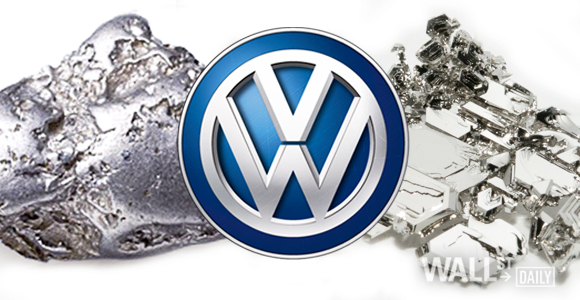
On September 29, the price of platinum fell below $900 an ounce for the first time since January 2009.
The precious metal also reached its widest price discount to gold, according to Barclays, in over 25 years at $224 an ounce.
The reason for the fall is simple: the Volkswagen (VLKAY) diesel engine scandal. You see, platinum is a key component for diesel engine vehicles’ catalytic converters. On average, 5.5 grams are used in each converter.
As described by my colleague Greg Miller, the company wrote software that allowed its engines to outsmart emissions tests.
Diesel engines don’t emit much carbon dioxide. But they do emit a lot of unpleasant particulates and harmful nitrogen oxides. Apparently, Volkswagen couldn’t stop the emissions, so it found another “solution.”
Platinum Going Down
Platinum was already struggling before the scandal due to a rebound in supplies from the largest producer, South Africa, and a fall in demand for jewelry from China.
But sentiment in the market is now much worse since the Volkswagen news broke. The very real fear stalking the platinum market right now is that diesel engines will go the way of the dinosaur.
If that happens, the effect on platinum will be very real. Diesel makes up only about 1% of the vehicle fleets in the United States and Japan. But in Europe, it’s a different story. More than half the cars there run on diesel. The auto industry accounted for 40% of the world’s platinum demand in 2014, according to data from Johnson Matthey PLC.
Reuters calculations show that Europe’s annual demand for platinum used in diesel vehicles is about 1.7 million ounces. That’s roughly a quarter of global platinum consumption in 2014!
The scandal will only add to the decline in diesel and thus the demand for platinum will drop throughout Europe. Diesel was already on its way out as governments there were cracking down on it. Places like Paris and London announced plans months ago to eliminate diesel vehicles inside their city limits by 2020.













Leave A Comment